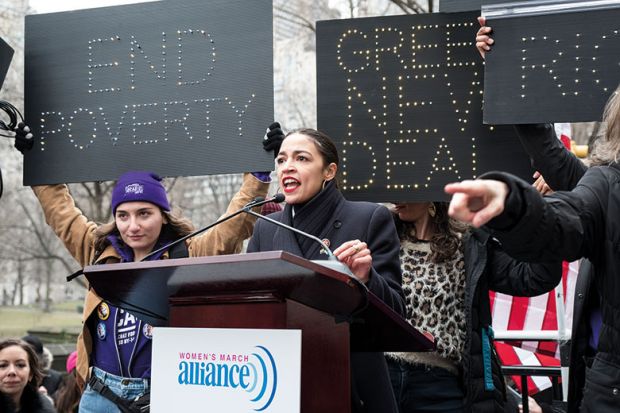An economic approach known as modern monetary theory is rapidly grabbing attention worldwide – some have claimed that it can rescue Western democracy – and giving a big boost to the little-known Midwestern US university that has long espoused it.
In just the past few weeks, modern monetary theory, or MMT, has become a central focus of a major economic and environmental initiative before the US Congress, a hot topic of debate for the world’s most influential central bankers and a growing curiosity for chattering pundits.
“It’s definitely having a moment,” said Stephanie Kelton, an economics professor who helped lead the development of MMT over the past 20-plus years at the University of Missouri at Kansas City.
MMT emphasises the need to look more seriously at the range of actors and interactions that drive economic activity than is commonly done in traditional economic models. One of its chief observations is that large national budget deficits on their own are not necessarily harmful, and that attacking them should be a very low priority compared with pursuing other goals such as ensuring broad economic well-being.
It has high-profile advocates and critics, crossing the boundaries of usual political camps. Among the most prominent backers is Alexandria Ocasio-Cortez, a Democrat from New York with celebrity standing despite just beginning her first term in the US House of Representatives. Ms Ocasio-Cortez sees MMT as fitting her call for heavy government spending to tackle income inequality and climate change through her “Green New Deal” legislation.
UMKC, meanwhile, sits far from the political and economic spotlights of Washington and New York. It is a major part of the Kansas City community, with 16,000 students and 126,000 alumni, but it claims no major standing in national measures of academic and research prowess. It is not even the flagship of the University of Missouri system.
“UMKC is a third-tier university in any status-game-type stuff,” admitted William Black, an associate professor of economics and law.
And for decades, dating back to the Second World War, such faculty members have tried to win some attention for their institution by pursuing unorthodox brands of economic theory.
With MMT, it may now be on the verge of a breakout.
Economics departments across the US produce about 1,000 doctoral graduates a year. UMKC puts out about a half-dozen of them. But that handful almost always get hired as faculty at other institutions, efficiently spreading the influence of MMT and UMKC. “We have vastly more policy effect than would be normal for a school like this,” Dr Black said.
Economics students now come to UMKC “knowing they want to be a professor”, said Professor Kelton, a former chair of the UMKC economics department. She later became a top economics adviser on Capitol Hill, and advised the Bernie Sanders presidential campaign, before taking her current post as a professor of public policy and economics at Stony Brook University.
From there, she has watched the spread of dozens of UMKC economics graduates into faculty positions nationwide, while helping to fend off MMT’s critics. And those critics are not just political conservatives.
One of her most sustained recent public debates was with Paul Krugman, the Nobel laureate and professor of economics at City University of New York, an unabashed political liberal who criticises MMT as a foolish belief that governments can print as much money as they like.
Similar dismissals have been offered by former US Treasury secretary and former Harvard University president Lawrence Summers, billionaire investor Warren Buffett and the heads of the central banks in the US, Europe and Japan.
Professor Kelton and her allies see such objections as clear misunderstandings of what MMT represents. Instead, they argue, MMT brings a recognition that other economic threats are far more serious than government deficits, and that this becomes apparent when decision makers take account of numerous real-world factors that traditionally are ignored by economists.
MMT’s proponents cite a series of major predictive successes to back up their claims. These include warnings that the euro currency would prove deeply destabilising when poorer member nations encountered problems, that the Obama administration’s post-recession economic stimulus was well justified and actually even too timid, and that harsh austerity measures in Europe and the US were bad policy.
“We’ve been doing this for 25 to 30 years,” Dr Black said of UMKC, “and our predictive record is superb.”
Political conservatives reject MMT and stick with traditional economic models, Dr Black said, because they welcome the failure of government programmes. “That confirms their views,” he said.
And many academics go along because doing otherwise would mean acknowledging years of teaching failed approaches, Dr Black said. The major economic disaster of the housing bubble and the Great Recession of 2008 and 2009 was completely missed by orthodox economists, he said, because their models do not even consider the possibility of people committing fraud and the value of regulatory protections.
For too many economics professors, Dr Black said, turning to embrace MMT would mean confessing that all the models they use assume that all the important questions do not exist.
POSTSCRIPT:
Print headline: Theory pays dividends for a modest Midwestern campus
Register to continue
Why register?
- Registration is free and only takes a moment
- Once registered, you can read 3 articles a month
- Sign up for our newsletter
Subscribe
Or subscribe for unlimited access to:
- Unlimited access to news, views, insights & reviews
- Digital editions
- Digital access to THE’s university and college rankings analysis
Already registered or a current subscriber? Login








